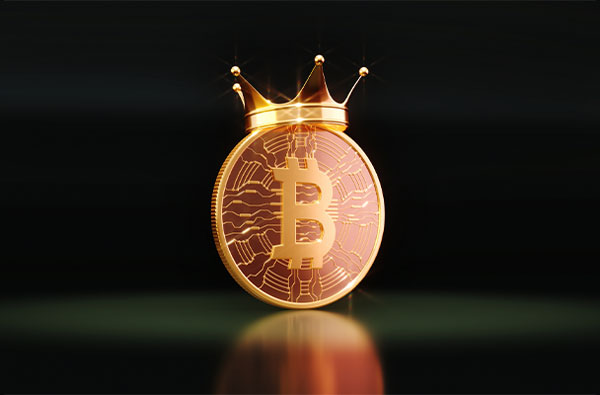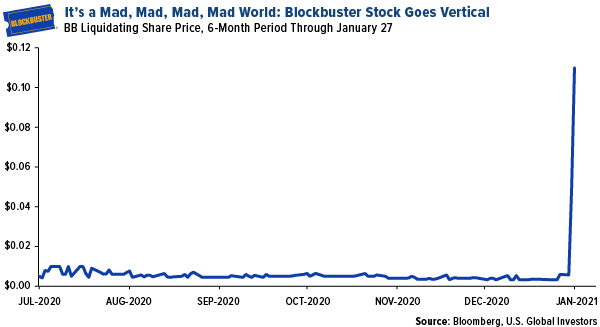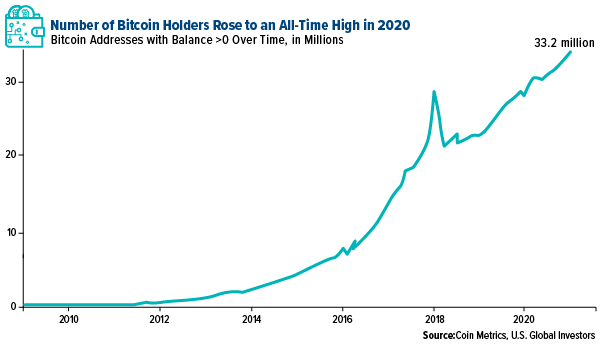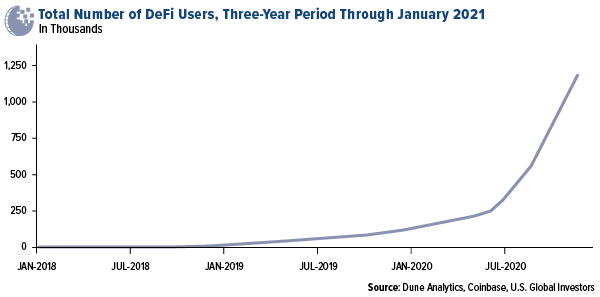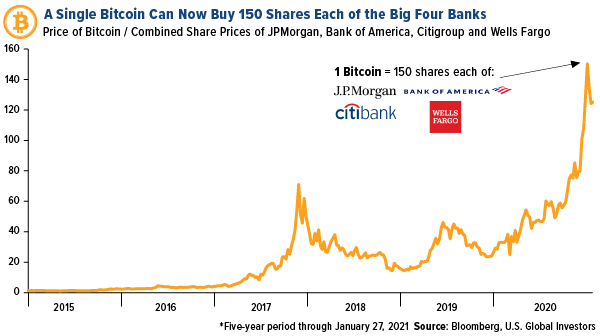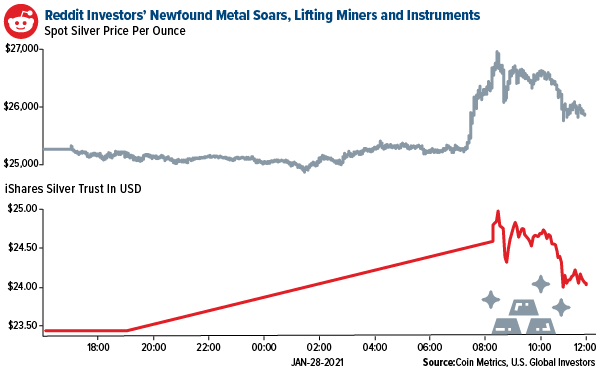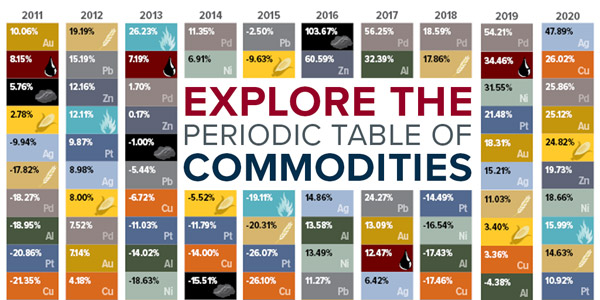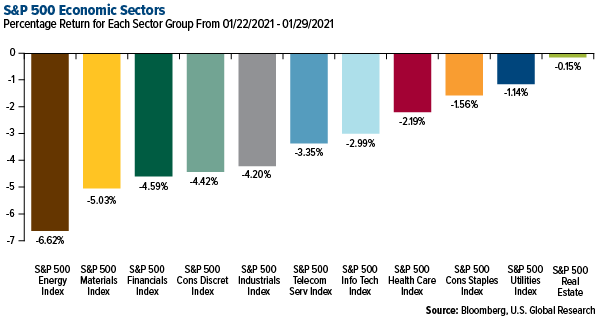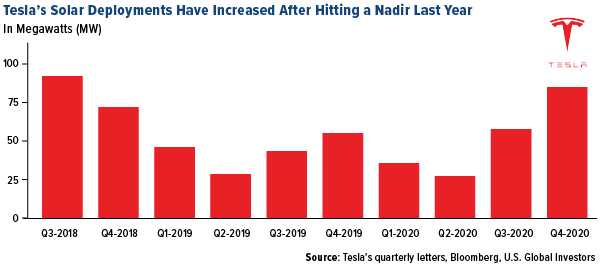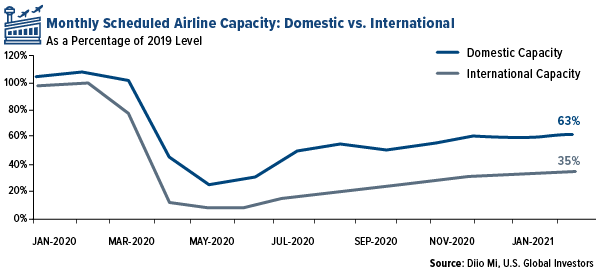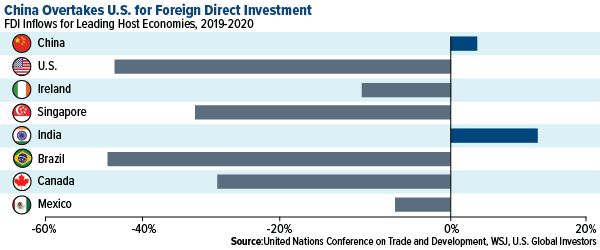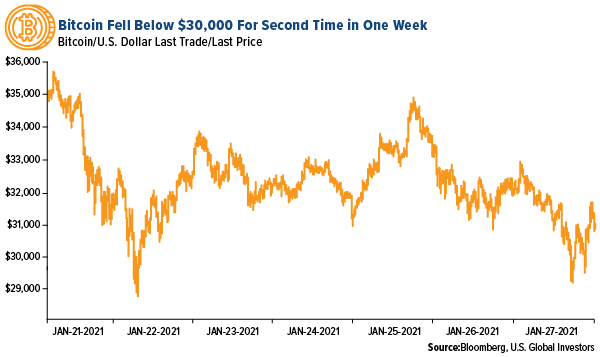
Power to the Players: Reddit, Robinhood and Bitcoin
NULL
By Frank Holmes
CEO and Chief Investment Officer
U.S. Global Investors

Those of you with kids and grandkids may at some point have stepped inside a GameStop. If so, you might be familiar with the video game retailer’s tagline: “Power to the players.”
The same slogan could just as easily be the rallying cry for the millions of millennial and Gen Z Reddit-users who took to Robinhood this week to drive up the share price of the beloved yet struggling GameStop.
(Fun fact: Ross Perot was one of the earliest seed investors in GameStop’s predecessor, Babbage’s, which first opened its doors in Dallas, Texas, in 1984.)
By now you’ve likely heard the full story. But just in case: A number of hedge funds, including Melvin Capital and Maplelane Capital, took out short positions in GameStop, whose sales were lagging even before the pandemic killed foot traffic. In response, anti-Wall Street organizers on Reddit urged readers to buy GameStop options en masse to catapult its shares “to the moon.” This in turn forced Melvin and others to buy GameStop shares at much higher prices to cover their positions, leading to multibillion-dollar losses.
This month alone, GameStop surged from around $19 a share to $325—a more-than 1,600% increase. The stock traded a head-spinning $100 billion worth of shares this week, more than Apple and Amazon, according to Bloomberg’s Eric Balchunas.
To traders who genuinely care about the company’s survival, I would suggest they consider supporting it by spending their money there this weekend.
The Reddit-fueled rally has drastically impacted price discovery in not just GameStop but other underdog stocks as well. Shares of movie theater operator AMC Entertainment, home goods retailer Bed Bath & Beyond, BlackBerry and Tootsie Roll Industries have also popped. Even Blockbuster’s liquidation holding company saw surreal levels of trading, its daily volume jumping from zero just a month ago to nearly 24 million shares on Thursday.
Gil Scott-Heron, considered by many to be the first rap artist, informed us back in 1971 that “The Revolution Will Not Be Televised.”
That may be so, but it will be tweeted, shared on Instagram, upvoted on Reddit and traded on commission-free Robinhood using decentralized Bitcoin and Ethereum. “Power to the players” indeed.
In Support of Democratizing Capital Markets
No matter where your opinion falls in all of this, you can’t deny that it’s historic. To my knowledge, nothing like this has ever happened before in capital markets, where millions of small traders, many of them using their $600 stimulus checks, worked in tandem to cripple wealthy institutional investors, leveraging their very own trading strategies against them.
In the process, a number of these traders have made life-changing amounts of money.
Let me be very clear: I’m in favor of Robinhood’s mission to democratize capital markets and finance, but like democracy itself, things can sometimes get messy. What the Redditors are doing is not investing. This isn’t the same as Robinhooders buying airline stocks after Warren Buffett dumped his positions in the big four carriers.
It isn’t even speculation. It’s activism—think of it as a type of anti-Wall Street “Arab Spring”—and I fear that some young people may get hurt when the bottom falls out.
Robinhood clearly felt the same when it halted trading in some of the heavily shorted stocks (and, on Friday, as many as 50 other stocks). The company, whose tagline is “Investing for Everyone,” tried to clarify its decision in an email this week, saying the temporary restriction “was not made on the direction of any market maker we route to or other market participants.”
Robinhood also emphasized its longstanding mission to open the capital markets up to a greater share of people, including younger and nontraditional investors:
The past year in particular has shown us that the financial markets are for everyone—not just institutional investors and hedge funds… Democratizing finance for all means giving more people access, not less.
Dalio: Bitcoin Is “One Hell of an Invention”
That brings me to Bitcoin, Ethereum and the crypto ecosystem in general, which is likewise democratizing finance. When you use a card to pay for your Starbucks, there’s a third party standing between you and the transaction. With Bitcoin and Ethereum, payments are peer-to-peer, open and free to move across borders.
For this reason and more, Ray Dalio this week called Bitcoin “one hell of an invention.”
In a blog post dated January 28, the Bridgewater founder wrote that it’s an “amazing accomplishment” that Bitcoin has been “rapidly gaining popularity as both a type of money and a storehold of wealth.” He added that, to him, Bitcoin looks like an attractive long-term option that he could one day put money in.
Dalio’s comment, I believe, underscores the reality that cryptos are rapidly going mainstream—as an investment, as stores of value and as currencies. It’s no longer just speculators who are participating, but well-known, highly respected investors and organizations.
Last week, in fact, inflows into cryptocurrency funds and products hit a new record of $1.31 billion, according to CoinShares. So far this year, Bitcoin has seen average daily trading volume of $12.3 billion, up significantly from $2.2 billion last year.
Another sign that Bitcoin is growing in popularity: The number of Bitcoin wallets that contained a positive balance reached a new record high in 2020, according to Coinbase’s 2020 in Review. An estimated 33.2 million wallets held Bitcoin, an increase of 16.8% from the previous year.
The Rise of DeFi, a Competitor to Traditional Financial Services
Decentralized finance (DeFi) also continued to grow in 2020. In short, DeFi has the potential to completely upend the traditional financial services industry by providing “global, programmatic, decentralized, 24/7/365 markets” for services as various as taking out loans, investing in derivatives, trading assets and buying insurance contracts. For the first time, financial product development has been put “directly in the hands of engineers, who no longer need to work at a bank and ‘ask permission’ to create products.”
According to Coinbase, there were 1.2 million DeFi users around the world taking advantage of these open-source systems. The number will only continue to grow.
I think one of the biggest signs that open-source technology is giving traditional finance a run for its money is that, today, a single Bitcoin is enough to purchase between 100 and 150 shares each of the big four U.S. banks. Compare that to five years ago, when one could only buy you about one share each.
We Were Early in the Crypto Ecosystem
Having said all that, I couldn’t be prouder to have helped bring HIVE Blockchain Technologies to market more than three years ago. It remains the only crypto miner that mines both Bitcoin and Ethereum.
Today, I’m pleased to say that HIVE ranked number four on the 2021 OTCQX Best 50, a ranking of top performing companies on the OTCQX Best Market based on 2020 total return and average daily dollar volume growth.
To get more of my thoughts on Bitcoin and Ethereum, watch my interview with Cointelegraph by clicking here!
Gold Market
This week spot gold closed the week at $1,847.65, down $7.96 per ounce, or 0.43%. Gold stocks, as measured by the NYSE Arca Gold Miners Index, ended the week lower by 2.04%. The S&P/TSX Venture Index came in off 2.68%. The U.S. Trade-Weighted Dollar rose 0.36%.
| Date | Event | Survey | Actual | Prior |
|---|---|---|---|---|
| Jan-26 | Hong Kong Exports YoY | 8.4% | 11.7% | 5.6% |
| Jan-26 | Conf. Board Consumer Confidence | 89.0 | 89.3 | 87.1 |
| Jan-27 | Durable Goods Orders | 1.0% | 0.2% | 1.2% |
| Jan-27 | FOMC Rate Deision (Upper Bound) | 0.25% | 0.25% | 0.25% |
| Jan-28 | Germany CPI YoY | 0.7% | 1.0% | -0.3% |
| Jan-28 | GDP Annualized QoQ | 4.2% | 4.0% | 33.4% |
| Jan-28 | Initial Jobless Claims | 875k | 847k | 914k |
| Jan-28 | New Home Sales | 870k | 842k | 829k |
| Jan-31 | Caixin China PMI Mfg | 52.6 | — | 53.0 |
| Feb-1 | ISM Manufacturing | 60.0 | — | 60.5 |
| Feb-3 | CPI Core YoY | 0.9% | — | 0.2% |
| Feb-3 | ADP Employment Change | 60k | — | -123k |
| Feb-4 | Initial Jobless Claims | 835k | — | 847k |
| Feb-4 | Durable Goods Orders | 0.2% | — | 0.2% |
| Feb-5 | Change in Nonfarm Payrolls | 50k | — | -140k |
Strengths
- The best performing precious metal for the week was silver, up 5.86%. The Reddit day-traders discovered silver this week after sending GameStop and other stocks soaring. Comments appeared on Reddit on Wednesday calling the iShares Silver Trust the “biggest short squeeze in the world”, citing banks as manipulators of precious metal prices. On Thursday while the iShares Trust gained as much as 7.2% and spot silver up 6.8%, prop traders likely piled into the trade too to take advantage of the momentum change.
- The World Gold Council (WGC) said in its 2021 outlook report that it expects gold demand to rebound from an 11-year low. Analysts say China’s economic recovery is already supporting an increase in gold jewelry demand. Gold consumption fell dramatically in 2020 due to record high prices and the pandemic taking a toll on economies.
- Newmont Corp. retained its top spot in the ESG ranking of miners, according to London-based Alva. Diamond giant De Beers came in second and Rio Tinto Group improved its score from the prior year. Proving to investors they are making strides toward sustainability is growing in importance. ESG and value-focused exchange traded funds recorded net inflows of $89 billion in 2020, almost three times 2019 levels, according to Bloomberg Intelligence.
Weaknesses
- The worst performing precious metal for the week was palladium, down 5.37%. Gold is set for its worst January in a decade. The U.S. dollar was supported by the Federal Reserve keeping its monetary policy unchanged of bond-buying at $120 billion per month. Bullion lost as much as 3% in January.
- Precious metals ETFs saw big outflows the week ended January 28, with investors withdrawing $819.9 million. The SPDR Gold Shares had the biggest outflow of $55.1 million, according to data compiled by Bloomberg.
- Fresnillo shares fell as much as 5.4% on Tuesday after RBC cited lower guidance as a key focus for the miner. Production forecasts for 2021 were 10% less than consensus and RBC analyst Tyler Broda said project delays need to be watched.
Opportunities
- GV Gold PJSC, a Russian gold miner backed by BlackRock, has revived plans for an IPO and hopes for a valuation above $1 billion, reports Bloomberg. The miner is controlled by the owners of Lanta-Bank and has projects at several Siberian deposits. The company produced around 260,000 ounces of gold in 2019, ranking it among one of Russia’s biggest 10 miners.
- Heraeus, a precious metals refiner, expects gold to hit a high of $2,120 an ounce this year due to stimulus efforts from central banks and a recovery in jewelry demand. In a report, Heraeus said it sees silver outperforming gold to top $36 an ounce and platinum could hit $1,200 an ounce.
- Goldman Sachs says global demand is now above supply in every major commodity market, apart from cocoa and zinc. “As long as demand is above supply and inventories are drawing, commodity returns will continue to accrue,” analysts say. Silver remains the bank’s preferred precious metal as it benefits from both debasement and a green energy led industrial recovery.
Threats
- Zimbabwe has reintroduced a controversial law that could force miners to sell majority stakes to local black investors, reports Bloomberg. Regulatory changes discussed last month would allow ministers of finance and mines the discretion to “prescribe” minerals that should be 51%-owned by indigenous investors. Zimbabwe holds the world’s third-largest known reserves of platinum-group metals, plus deposits of gold and diamonds. Investors have held back from spending on large projects even after the government appeared to soften the local ownership law in 2017. Such ownership laws deter foreign miners from operating in the country.
- In more Zimbabwe news, mining companies said a central bank rule compelling them to surrender more foreign exchange earned from mineral exports will push operations toward unviability. Bloomberg reports that on January 8 the government announced exporters must give 40% of foreign currency earnings, up from 30%, which is then paid out in the local currency.
- A growing chorus of big-name investors are throwing their weight behind Bitcoin, creating a threat to gold’s status as an alternative and “safe-haven” asset. Bridgewater Associates founder Ray Dalio said in a note this week that Bitcoin is “one hell of an invention” and said he’s considering crypto investments for new funds offering clients protection against currency debasement. “To have invented a new type of money via a system that is programmed into a computer and that has worked for around 10 years and is rapidly gaining popularity as both a type of money and a store hold of wealth is an amazing accomplishment,” Dalio wrote.
Index Summary
- The major market indices finished down this week. The Dow Jones Industrial Average lost 3.27%. The S&P 500 Stock Index fell 2.96%, while the Nasdaq Composite fell 3.49%. The Russell 2000 small capitalization index lost 4.06% this week.
- The Hang Seng Composite lost 4.27% this week; while Taiwan was down 5.50% and the KOSPI fell 5.24%.
- The 10-year Treasury bond yield fell 1 basis point to 1.075%.
Domestic Economy and Equities
Strengths
- Gross domestic product (GDP) increased at a 4% pace in the fourth quarter, slightly below the 4.3% expectation from economists surveyed by Dow Jones. Thursday’s report was the Commerce Department’s initial estimate of growth for the quarter.
- The number of people who applied for jobless benefits in late January fell to the lowest level in three weeks, but layoffs were still high early in the new year as the economy wrestled with a winter surge in the coronavirus pandemic. Initial jobless claims filed traditionally through the states fell by 67,000 to a seasonally adjusted 847,000 in the seven days ended January 23.
- Iron Mountain Inc was the best performing S&P 500 stock for the week, increasing 11.67%. Iron Mountain’s weekly gain, which at one point hit 37%, suggests it received some attention from the crew of retail investors driving other stocks into steep spikes. Iron Mountain, a midcap stock with big dividends, showed an unusually heavy short interest level.
Weaknesses
- States and cities have been bracing for major revenue shortfalls because of shutdowns since March to contain the virus, prodding them to eliminate more than 1.3 million jobs.
- Personal spending fell by 0.2% in December after falling by a downwardly revised 0.7 percent in November, according to the Commerce Department.
- Teradyne Inc was the worst performing S&P 500 stock for the week, decreasing 17.74%. The stock fell after its revenue forecast disappointed after a 48% rally from its last earnings report.
Opportunities
- Business economists are growing more upbeat about the economy’s prospects this year, while a greater share anticipate stronger sales and more hiring over the next three months. Nearly 70% of respondents in a survey by the National Association for Business Economics expect year-over-year growth of at least 3% by the end of 2021, up from 59% in the October survey. Some 47% see rising sales in the next three months, the most since the first quarter of 2019.
- The Honest Co., a baby and beauty products company co-founded by actress Jessica Alba, is preparing to go public, according to people familiar with the matter. The Los Angeles-based company backed by L Catterton is preparing to file confidentially for an initial public offering with the U.S. Securities and Exchange Commission as soon as Friday, said the people, who asked to not be identified because the matter isn’t public.
- Special purpose acquisition companies (SPACs) completed nearly $26 billion of share sales in January, surpassing the previous monthly record set in October, according to data compiled by Bloomberg. That’s helped fuel the $63 billion of IPO fundraising worldwide this year, more than five times the proceeds from the same period a year earlier.
Threats
- Data next week that will provide clues on the health of the economy are the ISM manufacturing and non-manufacturing PMIs on Monday and Wednesday, respectively, as well as factory orders on Thursday. If the numbers fail to impress and broader sentiment does not improve, the dollar could reverse some of this week’s gains.
- Ford was downgraded to underweight from equal-weight by Morgan Stanley analyst Adam Jonas, saying there are many important points yet to materialize around strategy and execution of the company’s potential transition out of internal combustion engines and into electric vehicles.
- Imperial Brands’ “cautious” strategy of focusing on its top markets at the expense of pushing for growth in next generation products reflects the firm’s weak position, Citi says as it cut the tobacco group’s stock to neutral from buy.
Energy and Natural Resources Market
Strengths
- The best performing commodity for the week was once again lumber, up 10.90%, although momentum dropped from the prior week’s gain of 20.08%. Goldman Sachs raised its copper price target to a whopping $10,000 a ton as investors expect a scarcity of the metal. The bank also said this week that global demand is now above supply in every major commodity market, apart from cocoa and zinc. “As long as demand is above supply and inventories are drawing, commodity returns will continue to accrue,” analysts say.
- South African chemical and fuel manufacturer Sasol Ltd. rose as much as 14% after announcing first half earnings are expected to more than triple. Bloomberg notes the company attributes strong performance on cost reduction and capital spending outweighing the hit from lower oil prices. Caterpillar Inc.’s fourth-quarter earnings beat analysts’ expectations on strong demand from construction industries. The company is often seen as a bellwether of the world’s economy.
- Exxon Mobil kept the S&P 500’s third-largest dividend of 87 cents a share. The oil giant’s shares fell 41% in 2020 and had analysts worried it could no longer afford the big dividend. Executives have vowed to defend the payout and reduced capital spending plans by about $10 billion a year to 2025 to support this goal.
Weaknesses
- The worst performing commodity for the week was iron ore, down 6.59% as the market sees China moving to be less reliant on iron ore imports. Zinc had its worst monthly decline since February after stockpiles rose 45% and investors turn bearish on prospects for China’s growth, reports Bloomberg.
- Net outflows from ETFs that focus on commodities totaled $902.3 million in the week ended January 28, according to data compiled by Bloomberg. This compares with $1.29 billion of inflows the week prior.
- Electricite de France SA (EDF) said its flagship British nuclear plant project will be delayed at
least six months and cost about $687 million more than previously planned because of the coronavirus pandemic. The company is also struggling to finish a French reactor more than 10 years behind schedule. Delays in completing nuclear plants are nothing new. Bloomberg notes the U.K. is likely dependent on nuclear as a source of low carbon electricity as demand is set to double by 2050.
Opportunities
- General Motors made the bold announcement of promising to sell only electric zero-emission models by 2035 and make all global operations carbon neutral by 2040. GM stock rose as much as 7.4% on the news. The carmaker’s goals are in line with California’s plan to ban sales of gasoline-powered cars and trucks by 2035.
- Renewables beat out fossil fuels in the EU for the first time in 2020. Renewables produced 38% of the bloc’s electricity last year, up from 34% in 2019. Analysis of grid data shows the 38% generated by renewables was enough to beat out fossil fuel’s 37% of the market. The shift away from coal has brought down the carbon intensity of Europe’s power by 29% in the last five years.
- Tesla’s solar-panel business deployed 86 megawatts in the fourth quarter for its best quarter since 2018. The electric vehicle maker reported earnings on Wednesday, which showed record revenue and lower-than-expected profit.
Threats
- Western state officials are warning that President Biden’s executive order halting new leases for oil and gas on federal lands will hurt investments, cut drops, lower wages and sink tax revenues throughout the region, reports Bloomberg. Biden issued several directives to fight climate change, including creating new jobs in green energy, but have created fears that it will hurt fossil-fuel reliant areas in the short-term.
- Leaking gas lines are a growing concern. Researchers are discovering that natural gas pipelines are leaking faster than utility companies understand. A study in Germany of methane levels by Hossein Maazallahi, a PhD candidate at Utrecht University, found 81 apparent leaks in Utrecht and 145 in Hamburg’s networks. Bloomberg reports that in 2020, researchers from SRON Netherlands Institute for Space Research figured out that methane from the Permian Basin, a hub of drilling activity in Texas and New Mexico, was double earlier estimates.
- Oil prices weakened, falling nearly 1% on Thursday, amid growing worry over the raging pandemic. “Concerns about the new COVID variants causing shutdowns in Europe and Asia, China especially,” are stoking worries over consumption, said Michael Lynch, president of Strategic Energy & Economic Research. “The market was balanced, and inventories were coming down,” but now “people are worried demand may weaken even further.”
Airline Sector
Strengths
- The best performing airline stock for the week was American Airlines, up 14.3%. Europe’s air safety regulator cleared the Boeing 737 MAX for a full return to service. This plane has been the subject of several well-publicized safety concerns over the past several months that forced a grounding in several major countries of the world. The U.S. and Brazil cleared the return of the 737 MAX late last year.
- Southwest is continuing to reduce costs as it announced another voluntary leave program. The company also designated a voluntary leave office, implying there may be many more programs to come. Nearly 17,000 employees have left permanently or temporarily since the pandemic began. The carrier has never had an involuntary layoff program in its history. The company is also sitting on $3 billion of unrestricted cash and is positioned well to survive the downturn. United Airlines is aggressively moving to reduce costs. Employees were offered a new deal with pay and health benefits if they leave the company. It is unclear how many have accepted this at this time.
- A federal mask mandate went into effect this month, which will require masks to be worn on all aircraft, aiming to stop the spread of coronavirus. This rule that was put into effect by a Presidential Order will backstop the airline-specific rules that have been in place since the pandemic began.
Weaknesses
- The worst performing airline stock for the week was Norwegian Air Shuttle, down 22.6%. Chinese airlines have been suffering from new Chinese travel rules for the week-long Spring Festival. Millions of trips are being cancelled for the spring while regulators are requiring a refund or a fee-free rescheduling. There is also a required COVID test for anyone who does fly. Bookings are down 55%. It is estimated that Chinese airlines typically earn up to 25% of their yearly profits during the Spring Festival season.
- Boeing reported a loss in 2020 of $11.9 billion, as airlines are reducing and parking their fleets on a worldwide basis, which reduces demand for new aircraft. Boeing also pushed out the debut of the 777X until late 2023, along with a $6.5 billion write down in this program.
- The U.S. has reimposed entry bans for non-U.S. citizens who have been in Europe, Brazil and South Africa over the past 14 days. Additionally, others will have to show proof of a negative COVID test. Any travelers to the U.S. will have to quarantine for seven days.
Opportunities
- Delta will activate 400 pilots from furloughed status in June as it prepares for a recovery in air travel as 2021 progresses. This is earlier than the original plan. The company continues to expect to be profitable in the third quarter.
- Norwegian Air was granted another five weeks of protection by the Irish court. This is a critical amount of time that will allow the carrier to present a restructuring plan that will allow it to emerge. Should the plan be approved, the Norwegian government has said it would back the carrier as it emerges from bankruptcy protection and become a 70% shareholder. Long haul flying has been discontinued, and staff has been reduced by 2,100. There will be an equity issuance by the end of February, and the carrier is targeting April for its exit from bankruptcy proceedings.
- Capacity continues to increase. KLM reached a deal with the Netherlands that will allow long haul flights to continue by requiring employees to take a rapid COVID test upon return to the Netherlands. This applies to departures and arrivals from the Netherlands. Frontier continues to add new routes as its business recovers. Most of the resumption is in Florida, particularly Orlando and Miami. A chart showing industry-wide additions to airline capacity is below.
Threats
- There is the risk of credit downgrades of European airlines. Traffic has fallen due to well publicized lockdowns in Europe. Airlines have turned to increasing fares to offset the lower volume, which may be exacerbating the problem. Airlines in Europe are lowering cash costs to keep cash burn down. Passenger traffic has fallen in Europe, but is starting to recover slowly with a full recovery expected by 2024. None of this has avoided the rating agencies, which may be on the verge of some downgrades in the European airline sector.
- New travel restrictions into the U.S. on January 26 that require a negative COVID test may hurt Air Canada the most, since they are heavily dependent on U.S. based routes. When Canada put these restrictions in place on January 6, nearly 50,000 reservations were cancelled. The carrier is responding by cutting back on fringe routes and reducing staff by 1,700.
- Future revenues from U.K.-based airlines are questionable. EasyJet indicated that it flew flights at 10% of normal capacity in the past quarter and did not offer guidance due to continuing lockdowns in the U.K. Revenues were down 88% with no future guidance. Ryanair revenues were down 77% for the same reasons. Wizz Air revenues were down 80% and it indicated that the next few months would be difficult.
Emerging Markets
Strengths
- The best relative performing country in emerging Europe for the week was Hungary, losing 26 basis points. The best performing country in Asia this week was Pakistan, gaining 1.1%.
- The Turkish lira was the best performing currency in emerging Europe this week, gaining 1.4%. The Chinese renminbi (yuan) was the best performing currency in Asia this week, gaining 84 basis points.
- China overtook the Unite States as the world’s top destination for new foreign direct investment last year. New investments by overseas businesses into the U.S. fell 49% in 2020, while China saw foreign investments climb by 4%. During the pandemic China strengthened its position as the world’s factor floor and expanded its share of global trade.
Weaknesses
- The worst performing country in emerging Europe for the week was Turkey losing 4.5%. The worst performing country in Asia this week was Vietnam, losing 9.4%.
- The Russian ruble was the worst performing currency in emerging Europe this week, losing 40 basis points. The South Korean won was the worst performing currency in Asia this week, losing 90 basis points.
- EU countries are slow in rolling out COVID-19 vaccinations. According to Bloomberg, the EU has administered just 2.2 doses per 100 people, versus 7.5 doses in the United States, and 11 doses in the United Kingdom and almost 45 doses in Israel. Vaccine supply in Europe may become a bigger issue as AstraZeneca plans to cut supplies to the bloc.
Opportunities
- Turkey’s Central Bank Governor said he will keep monetary policy tight until 2023, when inflation should stabilize, confirming the prior announcement that there is a change in the bank’s policy. The lira may finally stabilize this year and break its long-term downtrend against the dollar.
- MSCI indexes of developing-Asia stocks is trading at the most expensive levels against indexes for the Europe, Middle East and Africa region and Latin America since at least 2009. UBS Wealth Management and GAM Investments see Asia continuing its outperformance. Asia will likely remain atop emerging markets until the virus situation improves in the second half of this year, according to Rob Mumford, a money manager for emerging-market equities at GAM Investments in Hong Kong.
- Mainland China companies are reporting profits. 91% of the 1,200 firms that issued preliminary fourth quarter results so far in January have said earnings rose last year. The largest growth was reported in communication and healthcare sectors followed by consumer staples and technology.
Threats
- German Chancellor Merkel said that the pandemic has “slipped out of control” and stricter rules are needed to prevent a new wave of the disease. She commented that reopening stores in mid-February is not certain, and Germany would first open schools and daycare centers before opening stores and shopping malls.
- Protests are planned this weekend across Russia and Poland. In Russia, people will demand Alexei Novlany, the biggest opponent of Vladimir Putin to be freed from jail, where he is being held for 30 days over alleged parole violations. Poland will see anti-government rallies after strict abortion rules were implemented late Wednesday.
- Russia recorded its biggest population drop in 15 years, declining by 510,000 in 2020 to 146 million. Income inequality, declining disposable income and poor health conditions are the main factors contributing to the low birth rate and high death rate. Russia also reported a large number of deaths from COVID-19: 72,185 as of January 29, 2021.
Blockchain and Digital Currencies
Strengths
- Of the cryptocurrencies tracked by CoinMarketCap, the best performer for the week was Fantom, rising 430.46%.
- A new survey conducted by Gemini, the cryptocurrency exchange, showed an increasing number of women in the U.K. engaging with cryptocurrency investing. Out of the 13.5% of 2,000 respondents that are current or previous cryptocurrency investors, 41.6% were women, and that of the 9% that are planning on investing in such assets, 40% were women. The head of U.K. at Gemini, Blair Halliday, said that this new data demonstrates an increasingly diverse base engaging with crypto and indicates that the market is likely to evolve over the longer term.
- Australia’s eSafety Commissioner, Inman Grant, has suggested using a blockchain-powered ID solution to help tackle cyber abuse and trolling while allowing users to maintain a level of anonymity. She said that while anonymity is beneficial for general online use, people hiding behind anonymity online to harm others is a big problem in society. She added that blockchain-powered digital IDs could help strike a balance by hiding users’ details unless requested by law enforcement. SBI Holdings is partnering with Sumitomo Mitsui Financial Group (SMFG) to launch a digital stock exchange by spring 2022. The operator will be called the Osaka Digital Exchange and it will become Japan’s first exchange allowing investors to trade digital securities using blockchain technology.
Weaknesses
- Of the cryptocurrencies tracked by CoinMarketCap, the worst performing for the week was Ren, down 16.69%.
- Bitcoin fell below the $30,000 level multiple times during the week before rallying to $38,000 on Friday morning after Elon Musk changed his Twitter bio to “Bitcoin”. On the year chart, Bitcoin’s price fell below the 50-day moving average for the first time since early October, indicating a short-term bearish outlook for the cryptocurrency. This sudden price increase showcases the volatility within the cryptocurrency markets that the regulators would want to curb if these assets are going to be used in everyday transactions.
click to enlarge
- Although cryptocurrency crimes dropped in 2020, DeFi hacks and crime surged during this period. A majority of these crimes were “rug pulls”, where a token is artificially hyped and inflated and the creators and early investors pull the plug after the pump, leaving the latecomers out of pocket. These bad actors liquidate the entire liquidity pool and leave the remaining token holders without liquidity and are thus unable to trade, wiping out the remaining value of the token.
Opportunities
- Coinbase Global, the world’s leading cryptocurrency exchange, intends to become a publicly traded company. The company had confidentially submitted a draft registration statement on Form S-1 with the SEC and the S-1 has not been made public yet. Coinbase recently announced that it had $90 billion in assets on platform at the close of 2020 and 43 million registered users compared to 13 million on Robinhood.
- Dogecoin, the shiba inu-themed coin, surpassed tweet records for any cryptocurrency as its price rose to a new record of $0.0078. The coin is up 481% for the week as of Friday morning. This rally comes on the back of r/wallstreetbets mentioning the cryptocurrency on reddit as well and investors flocking to the “meme” coin for gains.
- Grayscale Investments, the world’s largest digital asset manager, has filed to register five new trusts for cryptocurrency assets, several connected to the decentralized finance (DeFi) space. On January 27, the company filed trusts for Aave, Cosmos, Polkadot, as well as privacy coin Monero and Cardano. These filings do not mean that the trusts will be launched but does lay the groundwork for a potential launch. The company commented that they make reservation filings based on what the consumer demand indicates.
Threats
- General Manager of Bank for International Settlements, Agustin Carstens, said on Wednesday that Bitcoin is an inherently risky asset and that only central banks should issue digital currencies. He added that investors must be cognizant that Bitcoin may well break down altogether as it becomes more vulnerable to majority attacks as it gets to its maximum supply of 21 million coins. Often a critic of Bitcoin, Carstens also said that sound money is central to the global economy and it is central banks that are uniquely placed to provide this, and that if digital currencies are needed, central banks should be the ones to issue them.
- South African authorities are increasing their efforts to formally regulate and exercise more control over cryptocurrency trading in the wake of Mirror Trading International’s, the country’s largest Ponzi scheme, collapse. An investigation by the Financial Sector Conduct Authority (FSCA) revealed that MTI kept no accounting records or user database after claiming that it had 260,000 members and handled 23,000 Bitcoin.
- The Budget session of the Indian Parliament will consider The Cryptocurrency and Regulation of Official Digital Currency Bill, 2021 that prohibits all private cryptocurrencies and provides for a facilitative framework for an official digital currency to be issued by the Reserve Bank of India. This bill is being proposed after Bitcoin’s surge in the past quarter has driven interest in cryptocurrencies among new users. Further, it tries to tackle the rise in reports of fraud that come in part due to the unregulated cryptocurrency ecosystem.
U.S. Global Investors, Inc. is an investment adviser registered with the Securities and Exchange Commission ("SEC"). This does not mean that we are sponsored, recommended, or approved by the SEC, or that our abilities or qualifications in any respect have been passed upon by the SEC or any officer of the SEC.
This commentary should not be considered a solicitation or offering of any investment product.
Certain materials in this commentary may contain dated information. The information provided was current at the time of publication.
Some links above may be directed to third-party websites. U.S. Global Investors does not endorse all information supplied by these websites and is not responsible for their content.
Holdings may change daily. Holdings are reported as of the most recent quarter-end. The following securities mentioned in the article were held by one or more accounts managed by U.S. Global Investors as of (12/31/2020):
Southwest Airlines
Delta Air Lines
Air Canada
Tesla Inc
Newmont Corp
Amazon.com Inc
Apple Inc
*The above-mentioned indices are not total returns. These returns reflect simple appreciation only and do not reflect dividend reinvestment. The Dow Jones Industrial Average is a price-weighted average of 30 blue chip stocks that are generally leaders in their industry. The S&P 500 Stock Index is a widely recognized capitalization-weighted index of 500 common stock prices in U.S. companies. The Nasdaq Composite Index is a capitalization-weighted index of all Nasdaq National Market and SmallCap stocks. The Russell 2000 Index® is a U.S. equity index measuring the performance of the 2,000 smallest companies in the Russell 3000®, a widely recognized small-cap index. The Hang Seng Composite Index is a market capitalization-weighted index that comprises the top 200 companies listed on Stock Exchange of Hong Kong, based on average market cap for the 12 months. The Taiwan Stock Exchange Index is a capitalization-weighted index of all listed common shares traded on the Taiwan Stock Exchange. The Korea Stock Price Index is a capitalization-weighted index of all common shares and preferred shares on the Korean Stock Exchanges. The Philadelphia Stock Exchange Gold and Silver Index (XAU) is a capitalization-weighted index that includes the leading companies involved in the mining of gold and silver. The U.S. Trade Weighted Dollar Index provides a general indication of the international value of the U.S. dollar. The S&P/TSX Canadian Gold Capped Sector Index is a modified capitalization-weighted index, whose equity weights are capped 25 percent and index constituents are derived from a subset stock pool of S&P/TSX Composite Index stocks. The S&P 500 Energy Index is a capitalization-weighted index that tracks the companies in the energy sector as a subset of the S&P 500. The S&P 500 Materials Index is a capitalization-weighted index that tracks the companies in the material sector as a subset of the S&P 500. The S&P 500 Financials Index is a capitalization-weighted index. The index was developed with a base level of 10 for the 1941-43 base period. The S&P 500 Industrials Index is a Materials Index is a capitalization-weighted index that tracks the companies in the industrial sector as a subset of the S&P 500. The S&P 500 Consumer Discretionary Index is a capitalization-weighted index that tracks the companies in the consumer discretionary sector as a subset of the S&P 500. The S&P 500 Information Technology Index is a capitalization-weighted index that tracks the companies in the information technology sector as a subset of the S&P 500. The S&P 500 Consumer Staples Index is a Materials Index is a capitalization-weighted index that tracks the companies in the consumer staples sector as a subset of the S&P 500. The S&P 500 Utilities Index is a capitalization-weighted index that tracks the companies in the utilities sector as a subset of the S&P 500. The S&P 500 Healthcare Index is a capitalization-weighted index that tracks the companies in the healthcare sector as a subset of the S&P 500. The S&P 500 Telecom Index is a Materials Index is a capitalization-weighted index that tracks the companies in the telecom sector as a subset of the S&P 500. The NYSE Arca Gold Miners Index is a modified market capitalization weighted index comprised of publicly traded companies involved primarily in the mining for gold and silver. The Consumer Price Index (CPI) is one of the most widely recognized price measures for tracking the price of a market basket of goods and services purchased by individuals. The weights of components are based on consumer spending patterns. The Purchasing Manager’s Index is an indicator of the economic health of the manufacturing sector. The PMI index is based on five major indicators: new orders, inventory levels, production, supplier deliveries and the employment environment. The S&P/TSX Venture Composite Index is a broad market indicator for the Canadian venture capital market. The index is market capitalization weighted and, at its inception, included 531 companies. A quarterly revision process is used to remove companies that comprise less than 0.05% of the weight of the index, and add companies whose weight, when included, will be greater than 0.05% of the index. Gross domestic product (GDP) is the monetary value of all the finished goods and services produced within a country’s borders in a specific time period, though GDP is usually calculated on an annual basis. It includes all of private and public consumption, government outlays, investments and exports less imports that occur within a defined territory.
Frank Holmes has been appointed non-executive chairman of the Board of Directors of HIVE Blockchain Technologies. Mr. Holmes owns shares of HIVE while U.S. Global Investors owns convertible securities. Effective 8/31/2018, Frank Holmes serves as the interim executive chairman of HIVE.













